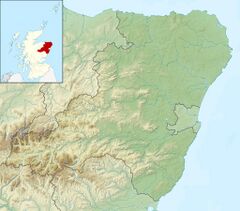Social:Deeside Gaelic
From HandWiki
Short description: Dialect of Scottish Gaelic
This article possibly contains inappropriate or misinterpreted citations that do not verify the text. (February 2023) (Learn how and when to remove this template message) |
| Deeside Gaelic | |
|---|---|
| Aberdeenshire Gaelic | |
| Scottish Gaelic: Gàidhlig Shrath Deathain | |
| Region | Aberdeenshire |
| Extinct | 18 March 1984 with the death of Jean Bain |
Indo-European
| |
Early forms | Primitive Irish
|
| Language codes | |
| ISO 639-1 | gd |
| ISO 639-1 | gla |
| ISO 639-3 | gla |
| Glottolog | scot1245[1] |
Deeside Gaelic is an extinct dialect of Scottish Gaelic spoken in Aberdeenshire until 1984.[2] Unlike a lot of extinct dialects of Scottish Gaelic, it is relatively well attested. A lot of the work pertaining to Deeside Gaelic was done by Frances Carney Diack,[3][4] and was expanded upon by David Clement, Adam Watson[5] and Seumas Grannd.[6]
Decline
In Aberdeenshire, 18% of Crathie and Braemar and as much as 61% in Inverey were bilingual in 1891.[7] By 1984, the dialect had died out.
Features in Deeside Gaelic
In the mid-20th Century the Scottish Gaelic Dialect Survey was undertaken when there were still people who spoke Deeside Gaelic. Features of Deeside Gaelic include:
- dropping of unstressed syllables; an example of this is the Word "Duine" becoming "duin'"[8]
- weakening of the /o/ to a /u/ sound, words such as "Dol" being pronounced closer to "Dul"[9]
- slender nn being pronounced like an English ng [10]
- mutation of f instead of being dropped is pronounced as a /v/ or /b/ or /p/ in Speyside[11]
- dropping of -adh, words such as tuilleadh being recorded as tull[12]
- conditional final stop; conditional tense was realised as a /g/ or /k/ sound in Braemar[13]
- shortening of words; words such as agaibh being pronounced closer to "aki" and cinnteach being shortened to cinnt [14]
References
- ↑ Hammarström, Harald; Forkel, Robert; Haspelmath, Martin, eds (2017). Glottolog 3.0. Jena, Germany: Max Planck Institute for the Science of Human History. http://glottolog.org/resource/languoid/id/scot1245.
- ↑ "Gaelic in the North East | The School of Language, Literature, Music and Visual Culture | The University of Aberdeen". https://www.abdn.ac.uk/sll/disciplines/gaelic/gaelic-in-the-north-east-325.php.
- ↑ "Papers of and relating to Francis Carney Diack - Archives Hub". https://archiveshub.jisc.ac.uk/data/gb231-ms2276,ms2636,ms2771.
- ↑ King, Jacob. A (re-)examination of the work of F. C. Diack (1865-1939). https://www.academia.edu/11984186.
- ↑ "Clement (David)". https://bill.celt.dias.ie/vol4/author.php?AuthorID=2711.
- ↑ "Grannd (Seumas)". https://bill.celt.dias.ie/vol4/author.php?AuthorID=183.
- ↑ "Upper Deeside". https://doug5181.wixsite.com/aberdeenshire-gaelic/services.
- ↑ SGDS vol. 3: 360
- ↑ SGDS vol. 5: 689
- ↑ SGDS vol.2:167
- ↑ SGDS vol. 3: 384
- ↑ SGDS vol.2: 133
- ↑ SGDS vol.3:281
- ↑ SGDS vol.3: 281

